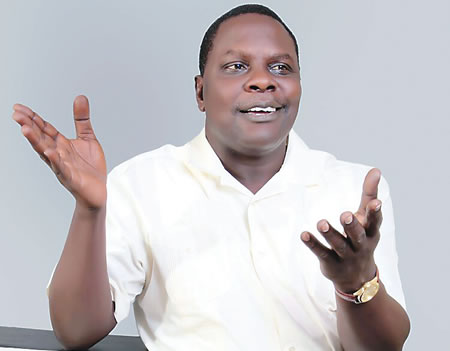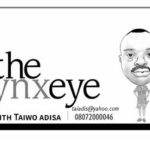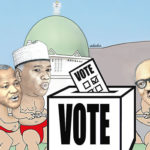THERE has been a concurrence between the two chambers of the National Assembly on the change of order of elections. What do you make of the decision of the lawmakers, coming after INEC had announced a different order and timetable?
When it comes to the issue of lawmaking or amending extant ones, we all know it is the duty of the National Assembly. But the change of election order, though people may want to shy away from it, is purely political and we have to understand that. INEC should be silent on this development and be very careful not to get involved in the mess that will still come. We all know that once the presidential election is done first, there is always a bandwagon effect on other elections. There is a very high tendency that subsequent elections may swing in the direction of the party that wins the presidential election. So, what the National Assembly members have done now has shown that they want to ensure they secure their own election first and then they can from there choose whether or not to vote for the presidential candidate of their party. It is not for the benefit of Nigerians really but for selfish personal reason. Largely, our democracy is still woven around individuals rather than institutions. A Senator or a governor can tell people who to vote for and who not to vote for. In 1983, the late Dr Olusola Saraki who was the leader of the National Party of Nigeria (NPN) at the Senate, told the people of Kwara to vote for NPN in the presidential election. But when it was time for the governorship election, he told them to vote for a Unity Party of Nigeria (UPN) governorship candidate a week later. That was how Cornelius Adebayo won the election. This can only happen in a democracy driven by individuals. This is why the governing All Progressives Congress (APC) is unsettled.
For INEC to remain an unbiased umpire, amidst all of these developments and not to be seen to be working for the Presidency, it must be calm and accept the amended order of elections. President Muhammadu Buhari should also accept it and sign the law. INEC still has about a year to prepare for the election. If Buhari refuses to sign it, there is another meaning that will be read into his refusal. The election of the National Assembly and the president has three components- House of Representatives, Senate and the president’s-all on a single day. I heard some saying that about a month will be spent on elections alone. My position is that if it will take six months for us to get it right in terms of free, fair and credible elections, so be it. It took months to get it right in India, which is one of the biggest democracies in the world. Anyone who opposes the National Assembly knows the order does not favour Buhari and will be doing so as a supporter of the president.
Do you see the change of election as a carryover of the internal squabbles in the APC?
There is no doubt about the fact that it is. Let Nigerians not be deceived, APC is the most polarized party in the country today. It is a party made up of ACN, CPC and new PDP in the main. The state controlled by those in the new PDP then gave Buhari about 3.5 million votes, whereas Buhari defeated Dr Goodluck Jonathan by about 2.5 million votes. So, the new PDP elements are very relevant in APC. But today, many of them see what is happening to the Senate President Dr Bukola Saraki as a political persecution. So, these people know if Buhari wins, it will be difficult for them to win their own election as Buhari will move against them. There is a big crisis in the party. Buhari said Senator Bola Tinubu should go and settle the rift in the party, while this is laudable, Tinubu being a wounded lion. His candidate in the Kogi election debacle, James Faleke was not allowed to fly the party’s flag. The same thing happened to him in Ondo State guber election too. Tinubu can’t do the job assigned to him because he is number one aggrieved person in APC today. There is the thinking that the job was given to him to humiliate him. The governor of Kano State, Abdulahi Ganduje has said it is over between him and Senator Rabiu Kwankwaso. The crisis in Kano ought to have been resolved a long time ago, but the party leaders allowed it to fester. Kwankwaso will go to another party and there will be an implosion in the party soon.
Was the change of election order a mistake on the path of the National Assembly who did not react when INEC announced election timetable or it is the electoral commission that jumped the gun?
If we go memory lane, in 2007, it took the Professor Maurice Iwu four days after the Supreme Court judgment to put former Vice-President Atiku Abubakar on the ballot paper. So, INEC’s timetable over the years has been fixed and unfixed so to speak. INEC’s pronouncement is not law. It is also on record that INEC has never had a fixed pattern or order of elections. In 2003, it was the governorship and the state House of Assembly election that was held first. But under Professor Attahiru Jega, it was the National Assembly election that was first conducted. So, INEC should not worry so much about which election comes first or last. I heard some people talking about logistical challenge. That is inconsequential. Elections won’t be held until February, so INEC has enough time to prepare and do a good job if it wants to. Even if INEC had printed the ballot papers, it still has plenty time to reprint and do the election.
The portions of the Electoral Act the National Assembly amended are so numerous. For instance, the kind of situation in Kogi State where somebody who did not participate in the election became the governor has been taken care of. That can’t happen again. We can be so carried away by the word ‘Independent’ included in INEC’s name. That word does not make the body to be independent. What makes it independent is when it conducts free, fair and credible elections. If Buhari wants to be sincere, he should just accept what the lawmakers have done and sign the amended Act. If he refuses to so do, then we believe there is connivance between him and INEC and it will be very dangerous.
Bitter complaints have trailed the ongoing continuous voter registration exercise. Where do you think INEC got it wrong?
The continuous voter registration exercise is a mess. In 2011, INEC registered about 11m voters within the same period. As I talk to you today, INEC has registered only four million. INEC is jst talking and wasting energy. In some of the states, INEC staff are in their offices at the local government level and they want people to come from more than 20 kilometres to come and register in a country where voter apathy is very high? The commission should have carried the registration to the electoral wards. In Lagos, where I live, INEC staff move to a ward in a day. In some areas, and that concludes the registration. This is not the best means to achieve this. People should ask INEC what is going on. Money is not a problem for the commission. Nigerians are more eager now to get their PVCs than in 2011. In the last one month, the organisations I head have mobilised more than 30, 000 people who don’t have PVCs to register across the country, but INEC has made things difficult for them through this cumbersome procedure.
Another key component of the amendment is the jail term prescription for INEC ad-hoc, particularly lecturers who are usually brought from the universities and tertiary institutions to play key role in election conduct. Does this resonate with you?
It is a welcome development because nobody should be above the law, whether the ad-hoc NYSC members or lecturers who are brought form tertiary institutions to rubber stamp election results. I will make a disclosure now. In 2015, Professor Jega gave a directive to INEC officers in states that they can engage federal civil servants from a particular level as ad-hoc staff. In the North, the same directive was given but INEC did not use the expression “federal civil servants.” It just used the word staff from ministries. Do you know what they did in the North? Many of the returning officers in the North were state civil servants by state governments. Only very few youth corpers were used there. NYSC members, just like election observers, have become endangered species in the country during election time. Many of the observers have become partisan, some of them are worse than the APC and PDP politicians that we criticise.
As of now, the idea of bring one professor from a university to serve as returning officer and announce election result he does not know anything about is fraudulent. By law, the chief returning officer for presidential election is the chairman of INEC. The chief returning officer for governorship election is the Resident Electoral Commissioner in the state. These lecturers and professors are not adding any value. Since their engagement, have electoral malpractices reduced? INEC just gives them money to carry them along. Most of these people stay in hotels or some cool spots and they later emerge to come and collate results. Were they on the field where election took place? Let the lecturers be engaged as presiding and polling officers so that they will not just be handed results to collate at the collation centres. Those who manipulate election results would have done their job perfectly and they will hand the result over to a professor to announce. The professors help INEC to legitimise what is illegitimate because they are usually not part of the election process at the crucial stages. It is pure madness.
Professor Iwu introduced this system because he was ASUU vice-president and Jega was the president and so brought in professors to carry them along. That was how this thing became a tradition, as though the professors are the most honest Nigerians. Many of them are partisan ab initio.
What is your advice on how the country’s electoral process can be better run to make Nigerians have confidence in the umpire and the system?
Let us go to the genesis, that is, the emergence of RECs. How did they emerge? Are they all not nominated and appointed by politicians? Did many of them not lobby for the position? Many of these RECs are recycled because those who nominated and appointed them know they are experts at manipulating elections. Until we have a stable INEC and system, we won’t get it right. A stable system will make INEC to conduct elections that will be won by party A today and party B tomorrow. It has become a tradition for RECs and INEC officials to want to return those who nominated them to office. So, the system is very rotten and toxic. In the last by-election in Taraba State, 63,000 people were registered and they came with their cards to vote. The card readers read their cards and validated them as authentic, but their names were not on the voter register. So, they could not vote. It is a big shame. So, having PVCs issued by INEC is not a warranty that the possessors will be able to vote in 2019. One more thing is that INEC should stop using state government offices are their own offices. Take for example, Ikeja Local Government Area houses the INEC office in that council. The properties INEC use in most states are given to them by state governments who expect something in return from INEC. Why can’t INEC headquarters provide offices for its state branches? At least, democracy has stabilised for 19 years. What is INEC doing with its huge housing budget? These are the questions begging for answers.
WATCH TOP VIDEOS FROM NIGERIAN TRIBUNE TV
- Relationship Hangout: Public vs Private Proposals – Which Truly Wins in Love?
- “No” Is a Complete Sentence: Why You Should Stop Feeling Guilty
- Relationship Hangout: Friendship Talk 2025 – How to Be a Good Friend & Big Questions on Friendship
- Police Overpower Armed Robbers in Ibadan After Fierce Struggle






